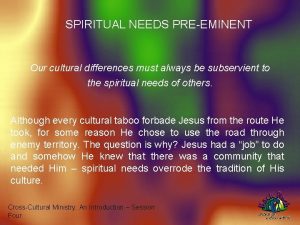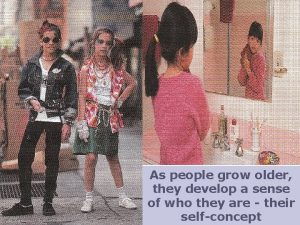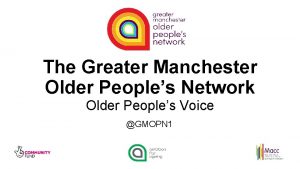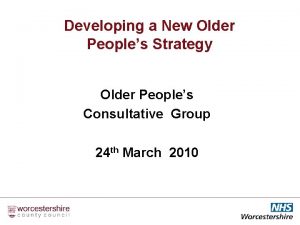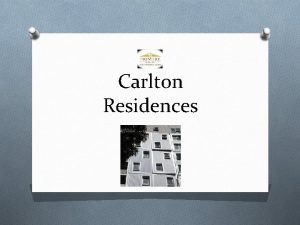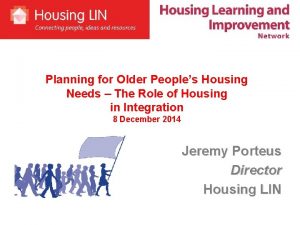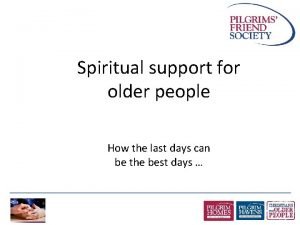Older peoples residences Spiritual needs of older people












- Slides: 12

Older people´s residences Spiritual needs of older people Good Life in Old Age –project Arja Suni Master of Health Science (Nursing), RN arja. suni@ikainstituutti. fi A. Suni 8. 10. 2009

Background • The mental health promoting tool was “Good everyday life in old age? Spiritual needs and elder care: Models of action” • The field trial started October 9 th 2008 and ended May 28 th 2009 • Why this tool? - Spiritual life is part of the history of an ageing person - The fulfilment of spiritual needs promotes the psychosocial wellbeing of older adults - The right to fulfil spiritual needs is a valuable part of good everyday life - The spiritual dimension includes not only religious beliefs but also a sense of purpose and meaning in life A. Suni 8. 10. 2009 2

The Aim • To develop methods for investigating the spiritual needs of older adults and how to answer them • To take into account individual religious and existential needs and habits • To understand the spiritual dimension as an issue of quality • To empower older individuals and their behaviour A. Suni 8. 10. 2009 3

The Subjects • The setting for implementation: Inhabitants and staff at the Residential Home Päiväkumpu (private sector) in Helsinki • 17 older people between 70 – 103 years, average 75+ years • Male 15%, female 85% • Education: mostly secondary education • Illness: both physical and mental diagnoses • Staff: 9 nurses, voluntary workers and students of nursing A. Suni 8. 10. 2009 4

Implementation process (methods) • There was a need to develop a personal questionnaire • Permission to carry out the project received in November 2008 • Before the questionnaire was ready there were 7 planning meetings with the staff and the questions were tested verbally • The new tool included 17 questions about the spiritual needs and habits of the older people • Participants and family members were given information about the purpose of the study, the voluntary nature of participation, and assurances that anonymity and confidentiality would be maintained • A personal nurse of each older adult performed the interview (1 April – 15 May 2009) • Information was gathered and evaluated • New daily work methods were created and tested A. Suni 8. 10. 2009 5

Results: What gives you strength in times of adversity? • • • Put one’s trust in God and Jesus Christ Find solace in arts, music, nature and friends There is a carrying force in prayer The close ones and nature are meaningful 90 % of the residents prayed daily or when necessary Almost all residents wished to say evening prayers together with their nurses • 90 % of the residents followed radio and TV prayers • 30 % of the residents wished for help in reading the Bible • A half of the residents were interested in spiritual literature and recordings A. Suni 8. 10. 2009 6

Results (strengths) • Nursing staff learned to understand individual spiritual needs and how to meet and talk about them • Open discussion about spiritual needs and habits brought older people and nurses closer to each other • Openness incereased the sense of community and mutual respect • Openness decreased anxiety, brought comfort and more attention was paid to spiritual needs A. Suni 8. 10. 2009 7

Results (weaknesses) • The questionnaire was made for people in Lutheran Church, it has to be modified for other religions • Cultural and social needs, i. e. , personal freedom to choose own life style must be respected • How to train nurses from other ethnic cultures to understand use this tool to provide holistic care? • How to teach ethnic and native older people to respect each other and their religions? A. Suni 8. 10. 2009 8

Conclusions • It is important to be a good listener, to respect and meet older people at their level without imposing one´s own values on them • It is important to facilitate the creation of contemplative surroundings • In order to implement holistic care and to pay attention to older people´s spiritual needs, it is essential that the organization of the care system is supportive both for patients and personnel • 90 % of these older people prayed every day – prayer is a strong psycho-social source of power Ø Are spiritual needs adequately observed, e. g. , in the prevention of suicides among older adults? A. Suni 8. 10. 2009 9

My lessons from practice for policy makers • Unfortunately, policy makers don’t realize what goes on in mental health work and how people with mental health disorders wish their care should be developed • Authorities should participate more often in seminars and conferences with staff who could tell them how to develop and support mental health work • Policy makers should learn to respect service-users and understand that user-led policy is a key to better life A. Suni 8. 10. 2009 10

Opportunities for the development of mental health promotion • More open discussion and information is needed about mental health problems, because anyone of us can face these problems sometime in life • More resources are needed in mental health work (funds, residences, doctors, therapists, nurses) • We must create and maintain supported work places for the mentally ill and disabled people • Young parents must be supported in parenting and taking responsibility of the family A. Suni 8. 10. 2009 11

The three main missing elements of policy at present – my opinion • Lack of knowledge, attitudes to diversity • Lack of will to improve things; for example, in Finland, responsibility for mental health issues is divided between many actors but nobody seems to take final responsibility • Skills and will to cooperation are insufficient (public sector, private sector, non-profit organisations and service users) A. Suni 8. 10. 2009 12
 Life is older than the trees
Life is older than the trees Comparing spiritual things with spiritual
Comparing spiritual things with spiritual It fulfills the spiritual needs of a culture.
It fulfills the spiritual needs of a culture. As people grow older
As people grow older Strategic gender needs and practical gender needs
Strategic gender needs and practical gender needs Primary needs and secondary needs
Primary needs and secondary needs Target needs analysis
Target needs analysis Satisfaction
Satisfaction Simple claustral complex
Simple claustral complex Residences of sherman plaza
Residences of sherman plaza Fabrikam residences
Fabrikam residences Fabrikam
Fabrikam Fabrikam residences
Fabrikam residences


